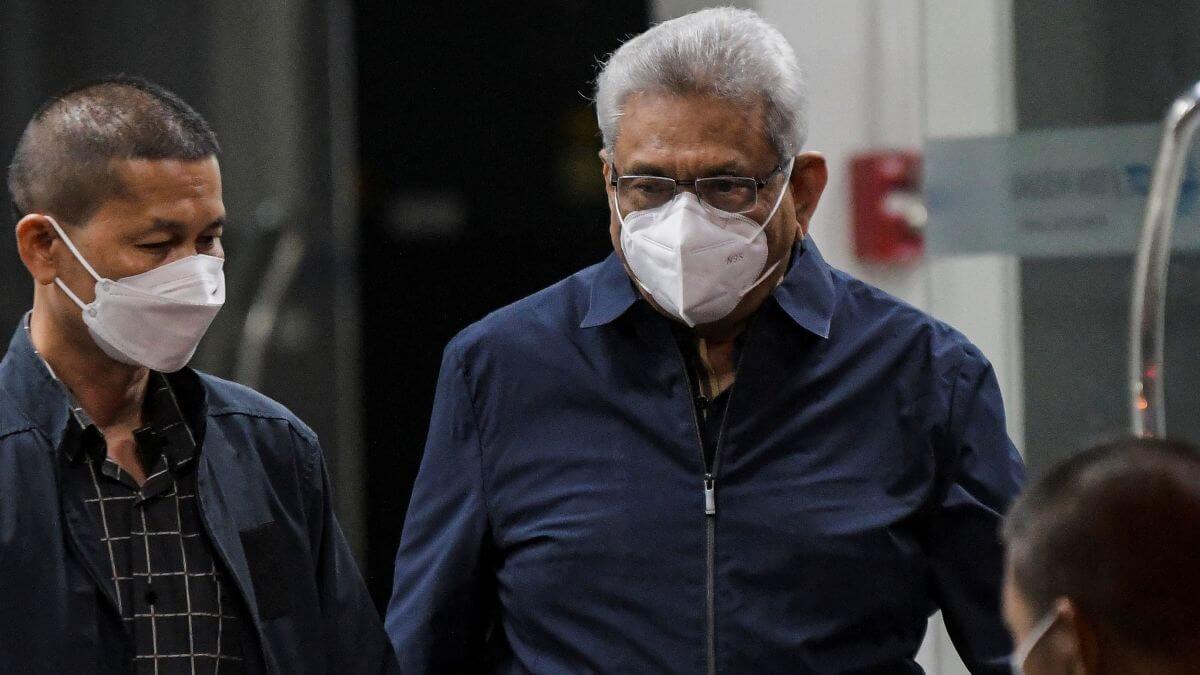Former Sri Lankan President Gotabaya Rajapaksa arrived in Bangkok on Thursday from Singapore to continue his exile after being ousted by widespread protests in Sri Lanka in mid-July.
Rajapaksa reportedly arrived at the Don Mueang Airport on Thursday evening on a charter plane for what Thai authorities claim is a temporary stay. Rajapaksa has been allowed to stay in Thailand for 90 days despite not having a visa because he holds a diplomatic passport.
Thai Prime Minister Prayut Chan-o-cha clarified that his visit is for “humanitarian” concerns, while Rajapaksa has reassured that he will not participate in political activities.
According to Tanee Sangrat, the chief of the Thai Department of Information and the spokesperson of the Ministry of Foreign Affairs, the Sri Lankan government had requested the government in Bangkok to allow Rajapaksa to seek refuge in the country. He added that authorities had approved the request in keeping with historically cordial Thai-Sri Lankan ties.
Gotabaya Rajapaksa spotted leaving the airport in Thailand
— Jamila Husain (@Jamz5251) August 11, 2022
Pics - Reuters pic.twitter.com/k8UY7RIIJt
However, he clarified, “The stay is temporary in nature with the aim of onward travel. No political asylum has been sought.” That being said, Sri Lanka and Thailand have not signed any extradition treaty.
Reports suggest that Rajapaksa has been seeking to return to Sri Lanka but has delayed the move on the advice of President Ranil Wickremesinghe. In fact, in an interview earlier last month, the new president said, “I don’t believe it’s the time for him (Rajapaksa) to return … I have no indication of him returning soon,” arguing that it could further inflame tensions on the island nations.
The exiled Sri Lankan leader arrived in Thailand the same day his Singaporean visa expired. After fleeing Sri Lanka amid worsening protests over the unprecedented economic crisis, he fled to Singapore on July 14 from the Maldives and tendered his resignation. Singaporean authorities granted him a 14-day short-term visit pass, which they extended until August 1.
Taking politics out of the equation, Mrs Ioma Rajapaksa was one of the most dignified and respected First Ladies we had.
— Rehan Jayawickreme (@RehanJayawick) August 12, 2022
It’s sad that she too had to take the fall for the mistakes made by her Husband and his family. pic.twitter.com/mzmLvscZ5z
Singaporean foreign minister Vivian Balakrishnan dismissed the possibility of offering asylum, saying, “In general, the Singapore government does not accord privileges, immunity and hospitality to former heads of state or heads of government.”
During Rajapaksa’s temporary stay in Singapore, a South Africa-based rights organisation filed a criminal complaint in Singapore seeking his arrest, accusing him not just of corruption but also of committing war crimes during the 25-year civil war that ended in 2009.
An international lawyer that drafted the complaint explained that Rajapaksa is subject to Singapore’s domestic laws under universal jurisdiction, which applies when an individual has committed” crimes that are of concern to humanity as a whole.”
Please note - Press release explaining the action against . @GotabayaR in #singapore now online in 3 languages - English, #tamil & #sinhalahttps://t.co/O2BXXDmPTL@agcsingapore https://t.co/peunUaKANZ
— ITJP (@itjpsl) July 24, 2022
Meanwhile, in Sri Lanka, citizens remain discontent with Rajapaksa’s replacement, Wickremesinghe, accusing him of abusing his power to shut down protests and criminalise dissenters via emergency measures. Protesters are continuing to demand a reduction in the president’s executive powers and have also raised concern that the current government is simply an extension of the Rajapaksa administration.
Furthermore, the country continues to face severe shortages of essential medicines, food, and fuel. Talks with the International Monetary Fund for a bailout deal also remain stalled amid the enduring political crisis.

